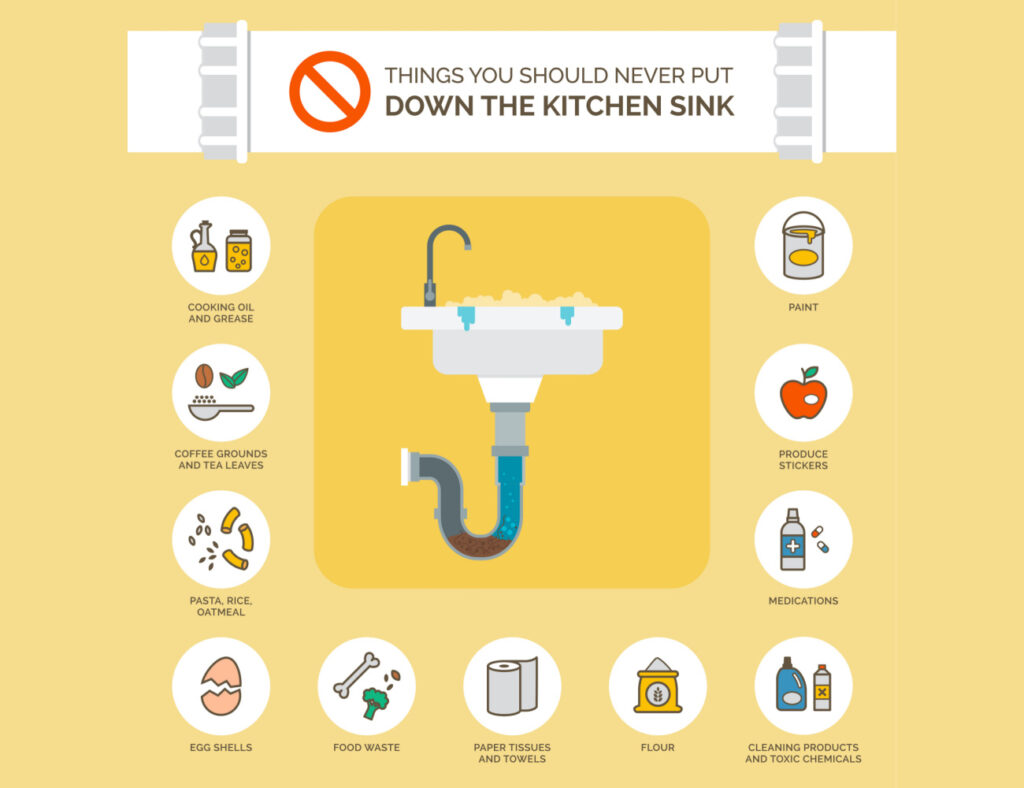Sink drains and strainers are made with small holes to let water flow through and keep large items out of the plumbing system. Many different things poured down sink drains clog pipes, damage sewer systems, and pollute the environment.
It is much easier and quicker to remove the kitchen sink strainer and wash leftovers down the drain. For a while. Until the drain gets smelly or the pipes become clogged. Then it can become time-consuming and costly. Never wash these things down the drain.

Grease
Grease and oils–like cooking oil, butter, salad dressing, and fat–may be the worst thing to pour down a drain. They stick to pipes. Then other waste adheres to the grease–narrowing the drain. Eventually clogging the drain.
Bacon grease congeals. It can float on top of the water left in P-traps and form a hard plug. Adding more debris makes the plug harder to remove. Hot water may remove some of the grease by melting it and flushing it away, but grease never mixes with water. You may eventually require a plumber to completely replace the drain.
Eggs and Egg Shells
Crushed eggshells function like sand in concrete. They embed into grease and oils–holding the clog together and allowing it to grow. Eggshell membrane sticks to pipes or accumulates other waste like coffee grounds, dirt, and food remnants.
Liquid eggs and milk used as a batter rinsed down the drain with hot water can cook into lumps if not completely washed away.
Flour
Flour mixed with water clots and sticks to itself and the sides of pipes. Once attached and dried out, it is difficult to remove. Clotted flour narrows pipes and can eventually lead to clogged drains.
Coffee Grounds
Coffee grounds look like they should easily disappear down the drain because they are small separate particles. Instead, ground coffee clumps together and is one of the most common causes of drain problems.
Pasta, Rice, and Potatoes
Pasta and rice absorb water and expand. Not just in boiling water but in the cold water in a drain. They are sticky when wet and form clumps that glue themselves to pipes and cause clogs.
Potatoes are a starchy food. They form a sticky paste when ground in garbage disposals and will glue to the sides of pipes.
Hair
Hair is tough, tangles, and does not decompose well. Once in a drain, it catches and holds almost anything. Hair is the major cause of shower and tub clogs. Beard or hair clippings rinsed down sink drains cause clogs. The pipes are smaller than tub and shower drains so it takes less hair to cause problems.
Medications
Crushing and disposing of left-over pills or pouring liquid medication down the drain will not clog the pipes. Instead, they will pass into water treatment systems which cannot filter them out. Eventually, medications pollute groundwater, streams, rivers, and oceans. They can end up back in drinking water.
Chemicals, Cleaning Products, and Paint
Leftover paint, turpentine, paint thinner, etc. should never be poured down drains. Paint can dry onto the insides of pipes and clog drains. Do not put any paint down drains–house paint, picture paint, or hobby paint.
Many cleaning products contain chemicals harmful to the environment. Undiluted bleach is very corrosive and can damage pipes. Bleach and chemicals can react with each other and with food to create dangerous compounds. Some may be explosive or toxic.
Water treatment plants and septic systems are incapable of filtering out chemicals. They end up in groundwater, streams, and ecosystems. There is always a chance of chemicals re-entering the drinking water system.
Soil
Repotting plants or washing off freshly dug vegetables in the sink seems like an easy way to dispose of the dirt. Potting soil contains peat moss and fibrous material like root hairs and compost. These materials along with the soil can easily help build existing clogs or start one.
Food Scraps
Sink strainers should always be in place when cleaning the remains of a meal off plates into a sink. Large scraps washed down the drain can lead to clogs. Clogs containing rotting food produce foul odors coming from the drain.
Having a garbage disposal and using it with lots of water helps to get rid of scraps. Clean your garbage disposal regularly to eliminate odors and keep it operating properly.
Regardless of how careful you are, something will get into the drain–coffee, dirt, plate scrapings, etc. Lack of water is one of the biggest causes of drain blockages. People tend to let the tap run for a few seconds until the sink is clean–then turn it off.
The P-trap in the drain is always full of water to prevent sewer gas from getting into the house. Too little water will not completely replace the standing water and flush things down the sewer line. Things that float like grease, food scraps, flour, and starches will stick to the pipes above the water line. Once dried, they may not come loose and the clog just grows.
Adblock test (Why?)
Powered by WPeMatico
